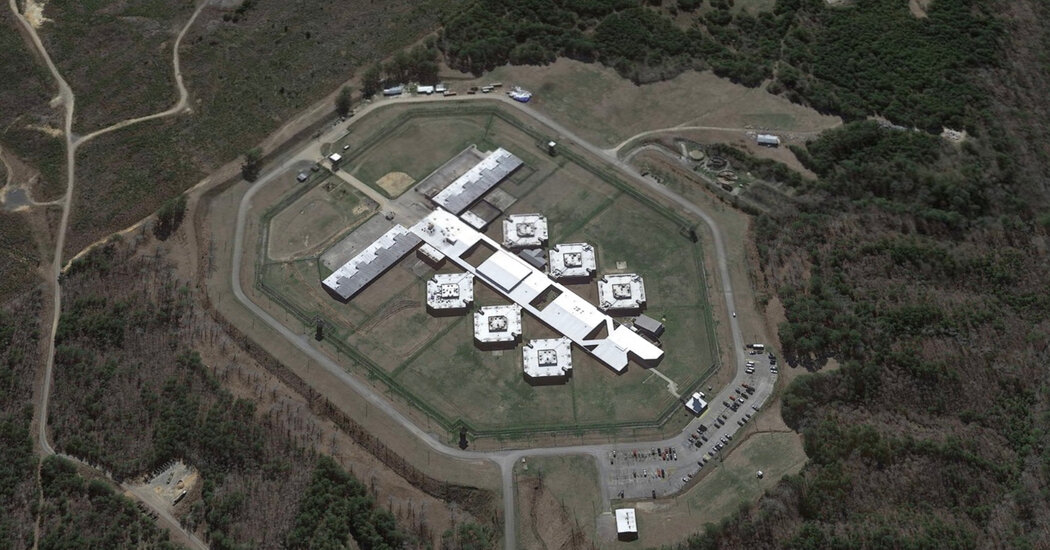
The plaintiffs, who are all Black, contend that the state regularly denies incarcerated people parole so that they can be “leased” out to make money for government agencies and businesses.
A group of current and former prisoners sued Alabama on Tuesday, saying that the state’s system of prison labor is a “modern-day form of slavery” that forces them to work, often for little or no money, for the benefit of government agencies and private businesses.
In the lawsuit, filed in U.S. District Court for the Middle District of Alabama, the 10 plaintiffs, who are all Black, say the state regularly denies incarcerated people parole so that they can be “leased” out to produce hundreds of millions of dollars in profits for local and state agencies and businesses every year.
The lawsuit accuses the Alabama Board of Pardons and Paroles of perpetuating the use of incarcerated workers by openly disregarding a 2015 state law that required it to make evidence-based parole decisions.
Instead, the lawsuit says, the board denies parole to anyone convicted of a violent offense, and disproportionately denies parole to Black people, particularly those who are deemed low-risk and eligible to participate in the state’s “extremely lucrative” prison work programs.
According to the lawsuit, the system effectively resurrects Alabama’s notorious practice of “convict leasing,” in which Black laborers, from 1875 until 1928, were forced to work for private companies, who in turn paid substantial fees to state and county governments.
Since 2018, about 575 companies and more than 100 public agencies in Alabama have used incarcerated people as landscapers, janitors, drivers, metal fabricators and fast-food workers, the lawsuit states, reaping an annual benefit of $450 million.
“They are trapped in this labor trafficking scheme,” the lawsuit states. “Although they are trusted to perform work for the state, local governments, and a vast array of private employers, some of the same people who profit from their coerced labor have systematically shut down grants of parole.”
Alimireo English, who is incarcerated at the Ventress Correctional Facility, a medium-security prison in Clayton, Ala., is one of the plaintiffs.
Mr. English, who was denied parole last month, said he supervises a dorm of 190 men that was rife with robberies and abuse before he took over and began enforcing the rules. He said he is on-call at all hours, and that his unpaid labor allows prison administrators to assign limited staff to more unstructured dorms and give overworked guards time off.
“They deny us parole to keep us doing the jobs,” Mr. English said in a phone interview. “The mentality is: ‘Why would the slave master let the slave go when he can continue working him for free?’”
The plaintiffs include two labor unions — the Union of Southern Service Workers and the Retail, Wholesale and Department Store Union, Mid-South Council — as well as the Woods Foundation, an Alabama nonprofit that provides investigative services to people with wrongful convictions or excessive sentences.
The unions argue that the use of incarcerated workers undermines their efforts to organize workers in the fast-food and poultry industries and depresses wages and working conditions. The Woods Foundation argues that it has had to devote additional money and staff time to address “the unfair and unlawful functioning of the parole system.”
The defendants include the governor of Alabama, Kay Ivey, the state attorney general, Steve Marshall, and the chair of the Board of Pardons and Paroles, Leigh Gwathney; local governments such as the City of Montgomery; and franchisees of McDonald’s, KFC, Wendy’s and Burger King.
The suit accuses defendants of violating a federal law that protects trafficking victims, the Equal Protection Clause of the 14th Amendment and the Alabama Constitution, which has prohibited slavery and involuntary servitude as punishment for crime since the passage of a 2022 ballot measure.
The suit asks the court to end Alabama’s “forced-labor practices,” order the parole system to make reforms and award damages to people who have labored in prison work programs, in an amount to be determined at trial.
Representatives of the parole and prison systems declined to comment on the lawsuit. Other defendants did not immediately respond to requests for comment.
The suit describes a system riddled with financial incentives to keep people incarcerated and working. The Alabama Department of Corrections, it says, collects 40 percent of the gross earnings that private employers pay incarcerated workers, nominally to defray the cost of their incarceration.
The lawsuit calls this a “labor-trafficking fee” that forces people to subsidize their own incarceration in prisons that were found, in a 2019 Justice Department report, to have had some of the highest rates of homicide and rape in the country.
The Alabama Department of Corrections also charges prisoners fees for basic services, like $15 a month for laundry and $5 a day for transportation to work, the lawsuit states.
Private companies are legally required to pay incarcerated people the prevailing wage. But they often earn far less in practice than the free workers laboring alongside them, the lawsuit states.
For example, a prisoner working for a private laundry service might be paid $7.25 an hour. But after factoring in the 40 percent paid to the state prison system, state and federal payroll taxes and laundry and transportation costs, the prisoner collects just $2.06 an hour, the lawsuit states.
Government entities have also benefited from using incarcerated people to work on roads and on major public buildings like the State Capitol, the Governor’s Mansion, the Alabama Supreme Court and Riverwalk Stadium, the home of the Montgomery Biscuits, a minor-league baseball team, the lawsuit states.
When working for such state and local entities, incarcerated people are typically paid $2 a day, the lawsuit says, the same daily rate that the State of Alabama set for incarcerated labor in 1927.
This post was originally published on this site be sure to check out more of their content.








